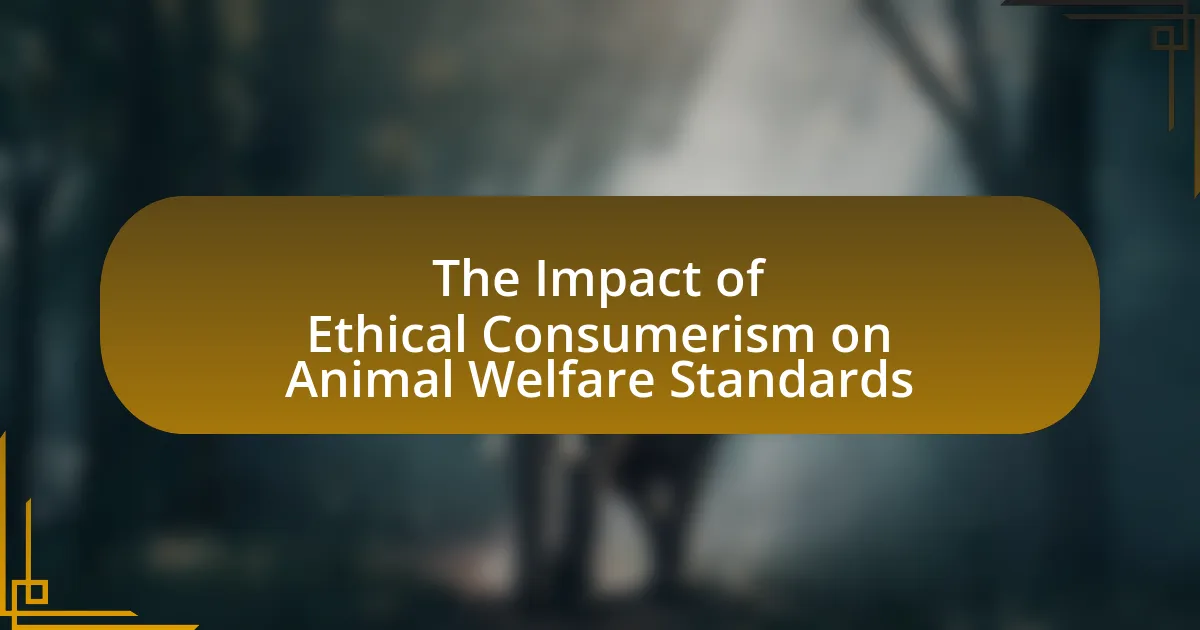The article examines the impact of ethical consumerism on animal welfare standards, highlighting how consumer demand for humane treatment influences corporate practices and legislative changes. It discusses key principles of ethical consumerism, such as sustainability and transparency, and how these principles shape consumer behavior towards animal products. The article also explores the role of certifications in guiding purchasing decisions, the challenges faced by ethical consumers, and the future implications of ethical consumerism on animal welfare standards globally. Additionally, it addresses how cultural differences and market trends affect perceptions and practices related to animal welfare.

What is the Impact of Ethical Consumerism on Animal Welfare Standards?
Ethical consumerism significantly improves animal welfare standards by increasing demand for humane treatment practices in food production and product sourcing. This consumer behavior pressures companies to adopt higher welfare standards to meet the expectations of ethically-minded shoppers. For instance, a study by the World Animal Protection organization found that brands responding to ethical consumer demands often implement better animal welfare practices, such as cage-free egg production and improved living conditions for livestock. Consequently, ethical consumerism not only influences market trends but also drives legislative changes aimed at enhancing animal welfare regulations.
How does ethical consumerism influence consumer behavior regarding animal products?
Ethical consumerism significantly influences consumer behavior regarding animal products by driving demand for ethically sourced and cruelty-free options. This shift occurs as consumers increasingly prioritize animal welfare, leading to a rise in purchases of products labeled as organic, free-range, or certified humane. For instance, a 2021 survey by the American Society for the Prevention of Cruelty to Animals (ASPCA) found that 70% of respondents were willing to pay more for products that ensure humane treatment of animals. This trend reflects a broader societal movement towards sustainability and ethical considerations in purchasing decisions, compelling companies to adopt higher animal welfare standards to meet consumer expectations.
What are the key principles of ethical consumerism?
The key principles of ethical consumerism include sustainability, transparency, and social responsibility. Sustainability emphasizes the importance of purchasing products that do not harm the environment, such as those made from renewable resources or with minimal carbon footprints. Transparency requires companies to provide clear information about their supply chains and production practices, allowing consumers to make informed choices. Social responsibility involves supporting fair labor practices and ensuring that products are made under humane conditions. These principles guide consumers in making choices that align with their values, ultimately influencing market trends and encouraging businesses to adopt more ethical practices.
How do consumers define ethical treatment of animals?
Consumers define ethical treatment of animals as the humane and respectful treatment of animals throughout their lives, including proper care, living conditions, and freedom from suffering. This definition encompasses practices such as providing adequate space, nutrition, and veterinary care, as well as ensuring that animals are not subjected to cruelty or exploitation. Research indicates that a significant portion of consumers prioritize animal welfare in their purchasing decisions, with studies showing that 70% of consumers are willing to pay more for products that are certified humane. This reflects a growing awareness and demand for ethical standards in animal treatment, influencing industry practices and policies.
Why is animal welfare important in the context of ethical consumerism?
Animal welfare is crucial in the context of ethical consumerism because it directly influences consumer choices and market demand for humane products. Ethical consumerism promotes the idea that purchasing decisions should reflect moral values, including the treatment of animals. Research indicates that 66% of consumers are willing to pay more for products that ensure animal welfare, demonstrating a significant market shift towards humane practices. This consumer behavior pressures companies to adopt higher welfare standards, thereby improving conditions for animals in agriculture and production.
What are the ethical implications of animal welfare standards?
The ethical implications of animal welfare standards primarily revolve around the moral responsibility humans have towards animals and the treatment they receive in various industries. These standards aim to ensure humane treatment, which reflects societal values regarding compassion and respect for sentient beings. For instance, research indicates that higher welfare standards can lead to improved animal health and reduced suffering, aligning with ethical principles that prioritize the well-being of living creatures. Furthermore, ethical consumerism drives demand for products that adhere to these standards, influencing companies to adopt better practices. This shift not only enhances animal welfare but also promotes transparency and accountability in industries such as agriculture and entertainment, reinforcing the ethical obligation to treat animals with dignity.
How do animal welfare standards vary across different industries?
Animal welfare standards vary significantly across different industries, influenced by factors such as regulatory frameworks, consumer demand, and ethical considerations. For instance, the livestock industry often faces stricter regulations regarding housing, feeding, and treatment of animals compared to the cosmetics industry, where animal testing may still be permitted in some regions. In the dairy sector, standards may include requirements for pasture access and humane milking practices, while in the poultry industry, there are guidelines aimed at reducing overcrowding and ensuring proper care. Research indicates that industries with higher consumer awareness and ethical consumerism, such as organic farming, tend to adopt more rigorous animal welfare standards, as seen in the rise of certifications like Certified Humane and Animal Welfare Approved.
What role do certifications and labels play in ethical consumerism?
Certifications and labels serve as essential tools in ethical consumerism by providing consumers with verified information about the ethical practices behind products. These certifications, such as Fair Trade or Certified Humane, assure consumers that the products meet specific ethical standards, including animal welfare, environmental sustainability, and fair labor practices. Research indicates that consumers are more likely to purchase products with recognized certifications, as these labels enhance trust and transparency in the marketplace. For instance, a study by the Nielsen Global Corporate Sustainability Report found that 66% of global consumers are willing to pay more for sustainable brands, highlighting the influence of certifications on purchasing decisions. Thus, certifications and labels play a crucial role in guiding consumer choices towards more ethical options, ultimately impacting animal welfare standards positively.
Which certifications are most recognized by consumers?
The certifications most recognized by consumers include the USDA Organic, Fair Trade Certified, and Certified Humane. These certifications are widely acknowledged due to their rigorous standards and consumer trust. For instance, the USDA Organic certification signifies that products meet strict agricultural standards, while Fair Trade Certified products ensure fair wages and ethical treatment of workers. Certified Humane focuses on animal welfare, ensuring that animals are raised with humane practices. According to a 2021 survey by the Hartman Group, 70% of consumers reported that they consider certifications when making purchasing decisions, highlighting the importance of these labels in ethical consumerism.
How do labels affect consumer purchasing decisions?
Labels significantly influence consumer purchasing decisions by providing essential information about product quality, ethical standards, and brand values. Research indicates that consumers are increasingly drawn to products with labels that signify ethical practices, such as organic, fair trade, or cruelty-free certifications. For instance, a study published in the Journal of Consumer Research found that 66% of consumers are willing to pay more for products with ethical labels, demonstrating a clear preference for transparency and social responsibility in their purchasing choices. This trend highlights the importance of labels in shaping consumer perceptions and driving sales in markets focused on ethical consumerism and animal welfare standards.

How does Ethical Consumerism Affect Animal Welfare Standards Globally?
Ethical consumerism significantly enhances animal welfare standards globally by increasing demand for humane treatment of animals in food production and other industries. This consumer behavior pressures companies to adopt higher welfare practices, such as cage-free egg production and grass-fed beef, to meet the expectations of ethically-minded consumers. For instance, a report by the World Animal Protection organization indicates that countries with strong ethical consumer movements, like the UK and Germany, have seen substantial improvements in animal welfare legislation and corporate policies. Additionally, a survey by the American Society for the Prevention of Cruelty to Animals (ASPCA) found that 70% of consumers are willing to pay more for products that ensure better animal welfare, further incentivizing businesses to improve their standards.
What are the global trends in ethical consumerism related to animal welfare?
Global trends in ethical consumerism related to animal welfare indicate a significant shift towards more humane treatment of animals in production systems. Consumers increasingly prioritize products that are certified humane, organic, or free-range, reflecting a growing awareness of animal rights and welfare issues. For instance, a 2021 survey by the World Animal Protection found that 70% of consumers globally are willing to pay more for products that ensure better animal welfare standards. Additionally, major retailers are responding to this trend by adopting animal welfare policies and sourcing from suppliers that adhere to higher welfare standards, such as the Global Animal Partnership. This shift is further supported by legislative changes in various countries aimed at improving animal welfare, such as the European Union’s ban on battery cages for hens.
How do cultural differences impact perceptions of animal welfare?
Cultural differences significantly impact perceptions of animal welfare by shaping beliefs, values, and practices regarding animals. For instance, in Western cultures, there is a strong emphasis on animal rights and welfare, often leading to stricter regulations and higher consumer demand for humane treatment of animals. In contrast, many Eastern cultures may prioritize utilitarian views of animals, focusing on their roles in agriculture or as sources of food, which can result in less stringent welfare standards. Research indicates that these cultural frameworks influence consumer behavior; a study published in the journal “Animals” by M. A. de Boer and J. A. van der Lans found that cultural background affects attitudes toward animal welfare, with individuals from cultures that emphasize animal rights being more likely to support welfare initiatives. Thus, cultural context plays a crucial role in determining how societies perceive and prioritize animal welfare.
What countries are leading in ethical consumerism practices?
Countries leading in ethical consumerism practices include Sweden, Denmark, and the Netherlands. These nations have implemented strong regulations and initiatives promoting sustainable and ethical consumption, such as Sweden’s commitment to a circular economy and Denmark’s focus on organic food production. The Netherlands is recognized for its transparency in supply chains and high standards for animal welfare, as evidenced by its ranking in the Ethical Consumer Markets Report, which highlights the growing demand for ethically sourced products.
How do businesses respond to the demand for ethical products?
Businesses respond to the demand for ethical products by implementing sustainable practices, enhancing transparency, and developing ethically sourced product lines. For instance, many companies have adopted certifications such as Fair Trade or organic labels to signal their commitment to ethical standards. According to a 2021 Nielsen report, 66% of global consumers are willing to pay more for sustainable brands, indicating a significant market shift towards ethical consumerism. This trend has prompted businesses to not only improve their supply chain practices but also to engage in corporate social responsibility initiatives that align with consumer values regarding animal welfare and environmental sustainability.
What changes are companies making to improve animal welfare standards?
Companies are implementing various changes to enhance animal welfare standards, including adopting higher welfare certifications, improving living conditions, and reducing the use of antibiotics. For instance, many companies are transitioning to cage-free systems for egg-laying hens, which aligns with consumer demand for humane treatment. Additionally, some organizations are committing to sourcing meat and dairy from farms that adhere to strict animal welfare guidelines, such as the Global Animal Partnership standards. These changes are driven by increasing consumer awareness and demand for ethically produced products, as evidenced by a 2021 survey indicating that 70% of consumers are willing to pay more for products that ensure better animal welfare.
How do market trends influence corporate responsibility in animal welfare?
Market trends significantly influence corporate responsibility in animal welfare by driving companies to adopt more ethical practices in response to consumer demand for humane treatment of animals. As consumers increasingly prioritize animal welfare in their purchasing decisions, businesses are compelled to align their practices with these values to maintain market competitiveness. For instance, a 2021 survey by the American Society for the Prevention of Cruelty to Animals (ASPCA) indicated that 70% of consumers are more likely to buy products from companies that demonstrate a commitment to animal welfare. This shift in consumer behavior has led many corporations to implement stricter animal welfare standards, such as sourcing from suppliers that adhere to humane treatment guidelines and adopting transparent supply chain practices. Consequently, market trends not only shape corporate policies but also enhance accountability in animal welfare, reflecting a growing societal expectation for ethical business practices.
What challenges do ethical consumers face in promoting animal welfare?
Ethical consumers face significant challenges in promoting animal welfare, primarily due to limited access to information about animal treatment in supply chains. Many consumers struggle to identify products that genuinely adhere to animal welfare standards, as labeling can be misleading or inconsistent. For instance, a study by the World Animal Protection organization found that only 30% of consumers felt they could trust animal welfare claims made by brands. Additionally, ethical consumers often encounter higher prices for humane products, which can deter widespread adoption. Economic constraints limit the ability of consumers to prioritize animal welfare over cost, as seen in research from the University of Cambridge, indicating that price sensitivity is a major barrier to ethical purchasing. Furthermore, the lack of regulatory frameworks and transparency in the food industry complicates the ability of consumers to make informed choices, as highlighted by the Food and Agriculture Organization, which emphasizes the need for clearer guidelines on animal welfare practices.
How do misinformation and greenwashing affect consumer choices?
Misinformation and greenwashing significantly distort consumer choices by creating false perceptions about products and their environmental impact. Misinformation can lead consumers to believe that certain products are more sustainable or ethical than they actually are, while greenwashing involves companies misleadingly portraying their practices as environmentally friendly. For instance, a study by TerraChoice found that 95% of “green” products surveyed engaged in some form of greenwashing, which misleads consumers and undermines genuine ethical consumerism. This manipulation can result in consumers making purchasing decisions based on inaccurate information, ultimately harming their ability to support truly sustainable and ethical practices.
What barriers exist for consumers trying to make ethical choices?
Consumers face several barriers when trying to make ethical choices, including lack of information, higher costs, and limited availability of ethical products. The absence of clear labeling and transparency in supply chains makes it difficult for consumers to identify truly ethical options. Additionally, ethical products often come with a premium price, which can deter budget-conscious shoppers. Furthermore, in many regions, ethical alternatives may not be readily accessible, limiting consumer choices. These barriers collectively hinder the ability of consumers to make informed and ethical purchasing decisions.

What are the Future Implications of Ethical Consumerism on Animal Welfare Standards?
The future implications of ethical consumerism on animal welfare standards are significant, as increasing consumer demand for ethically sourced products is likely to drive higher welfare standards in animal agriculture. Research indicates that ethical consumerism is influencing companies to adopt more humane practices, such as improved living conditions and better treatment of animals, to meet consumer expectations. For instance, a 2021 study by the World Animal Protection organization found that 70% of consumers are willing to pay more for products that ensure animal welfare, prompting businesses to enhance their animal welfare policies. This trend suggests that as ethical consumerism continues to grow, it will likely lead to stricter regulations and higher standards for animal welfare across the industry.
How might ethical consumerism evolve in the coming years?
Ethical consumerism is likely to evolve towards greater transparency and accountability in supply chains. As consumers increasingly demand information about the origins of products and the treatment of animals, companies will be pressured to adopt more ethical practices. A 2021 survey by Nielsen found that 73% of global consumers are willing to change their consumption habits to reduce environmental impact, indicating a strong trend towards ethical considerations in purchasing decisions. This shift will likely lead to enhanced animal welfare standards as businesses respond to consumer preferences for humane treatment and sustainable practices.
What technological advancements could impact animal welfare standards?
Technological advancements such as precision farming, automated monitoring systems, and genetic engineering could significantly impact animal welfare standards. Precision farming utilizes data analytics and sensors to optimize animal health and nutrition, leading to improved living conditions and reduced stress. Automated monitoring systems, including wearable technology, allow for real-time tracking of animal behavior and health, enabling timely interventions when issues arise. Genetic engineering can enhance disease resistance and improve overall animal well-being. These advancements collectively contribute to higher welfare standards by promoting healthier, more sustainable farming practices.
How can consumer advocacy shape future policies on animal welfare?
Consumer advocacy can significantly shape future policies on animal welfare by influencing legislative agendas and corporate practices. When consumers demand higher welfare standards, companies often respond by improving their practices to meet these expectations, as seen in the rise of cage-free egg production following consumer pressure. This shift not only leads to better treatment of animals but also encourages policymakers to adopt regulations that reflect public sentiment, such as the European Union’s ban on battery cages for hens, which was largely driven by consumer advocacy. Thus, the collective voice of consumers can drive systemic changes in animal welfare policies.
What practical steps can consumers take to support animal welfare through ethical consumerism?
Consumers can support animal welfare through ethical consumerism by choosing products that are certified humane or cruelty-free. This involves researching brands and selecting those that adhere to high animal welfare standards, such as those certified by organizations like the Humane Society or the Global Animal Partnership. Additionally, consumers can reduce their consumption of animal products, opting for plant-based alternatives, which studies show can significantly lower demand for factory-farmed animals. Supporting local farms that practice ethical treatment of animals also contributes positively, as these farms often prioritize animal welfare over profit. By actively participating in these practices, consumers can drive market demand towards more humane treatment of animals, thereby influencing industry standards.
How can consumers identify truly ethical brands?
Consumers can identify truly ethical brands by researching their supply chains, certifications, and transparency practices. Ethical brands often possess certifications from recognized organizations, such as Fair Trade or B Corp, which validate their commitment to social and environmental standards. Additionally, consumers should examine brands’ transparency regarding sourcing, labor practices, and animal welfare policies, as ethical brands typically provide detailed information about their practices. For instance, a 2021 study by the Ethical Consumer Research Association found that brands with transparent supply chains are more likely to adhere to ethical standards, reinforcing the importance of consumer diligence in identifying genuinely ethical brands.
What are the best practices for making ethical purchasing decisions?
The best practices for making ethical purchasing decisions include researching product origins, prioritizing companies with transparent supply chains, and choosing certified products that meet ethical standards. Researching product origins allows consumers to understand the environmental and social impacts of their purchases. Prioritizing companies with transparent supply chains ensures accountability and ethical labor practices. Choosing certified products, such as those with Fair Trade or organic labels, guarantees adherence to specific ethical guidelines. These practices contribute to improved animal welfare standards by supporting businesses that prioritize humane treatment and sustainable practices.
